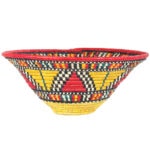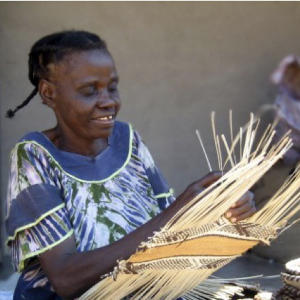No products in the cart.
About the basket weavers

We are proud to support African basket weavers by offering unique handmade baskets from throughout the African continent. These one-of-a-kind pieces of functional artwork are woven by African craftspeople who share our commitment to quality.
By weaving baskets in the traditional manner, the basket weavers of Africa — most of them women — are preserving their cultural heritage while they support themselves and their families.
We are pleased to promote the work of these skilled artisans who are contributing to sustainable economic development and stability throughout Africa.

We are members of the Fair Trade Federation, an organization that shares our strong belief that indigenous people around the world should be compensated fairly for their amazing work.
Learn more about Fair Trade
Botswana

Women of the Bayei and Hambukushu tribal groups painstakingly create this art from ‘mokola’ palm tree fiber coil woven around grass or vine. The bark and roots from 2 different trees are used to make the dye colors, as are decomposing sorghum husks and shrub leaves.

eSwatini (Swaziland)

Sisal Coil Woven Baskets
Weavers take an average of 30 hours to create an 8 inch basket which makes these some of the most labor intensive of all African baskets.

Ghana

Bolga Baskets
For many generations, weaving has been a traditional skill of the Gurune people of northern Ghana. Mostly done by women, basket weaving and other handicrafts supplement these subsistence farmers’ incomes.

Kenya

Beaded Wire Baskets
The Maasai and Kikiyu people continue a long history as some of the foremost bead workers in Africa.

Namibia

A portion of the proceeds from each basket sold goes to a fund which provides educational opportunities for the girls of Namibia.

Nubian Baskets (Kenya & Uganda)

Nubian refugees in Uganda, Kenya and other countries work hard to preserve their native culture through traditional activities such as basket weaving.

Rwanda

In Rwanda, “the land of a thousand hills”, weavers from many tribes, including the recently warring Hutus and Tutsis, create sisal bowl baskets as symbols of peace, reconciliation, self- reliance and hope.

Sahel region

We feature beautiful and functional harvest and storage baskets from Mossi, Fulani and Tuareg weavers.

South Africa

Zulu Wire Baskets
Since wire baskets are woven by many men due to the difficult nature of weaving wire, they are able to stay home on their tribal lands instead of moving to cities to look for work. In the rural groups we work with, the family units are preserved so that the African basket weavers and their families can live more traditional lifestyles.


Zulu Ilala Palm Baskets
The age-old tradition of basket weaving is usually passed down from grandmother to granddaughter. This helps to preserve Zulu culture as the grandmothers have the opportunity to recite oral history and stories to the younger generations as they all weave together.

Uganda

Bukedo & Raffia Baskets
This group is based in Kampala, Uganda and supports women within the city as well as in nearby villages. Their mission is to support as many marginalized women as possible through the promotion of their handcrafts.


Rwenzori & Virunga Baskets
The Batwa people are known as “The Keepers of the Forest” because they have inhabited the Bwindi Impenetrable Forest for over 60,000 years. The women who weave these baskets support themselves entirely by their craft.

Zambia

In the Western province of Zambia, not far from the border with Angola, the mostly Mbunda speaking people weave ruggedly unique baskets.

Zimbabwe

The weavers depend on basket income to sustain themselves beyond what food they grow as subsistence farmers. They often use the money earned to pay school fees for their children.

Shop with a conscience. Choose Fair Trade goods.
All of our African baskets are verified Fair Trade, because we believe that indigenous people around the world should be compensated fairly for their amazing work.